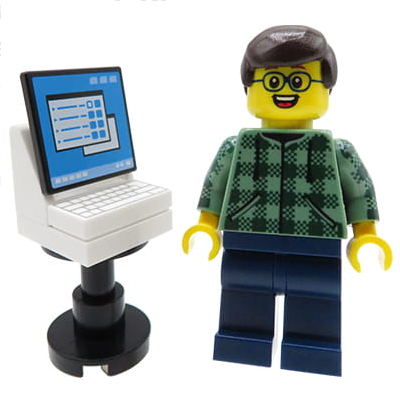I recently saw a social media post that said something like “I’m so tired of hearing people ask about use cases instead of just diving in and using new tools” and I was like “well I’m tired of people getting on Al Gore’s Internet and saying ridiculous things, so I guess we’re both gonna be unhappy.”
Let me set the stage (in a series of paragraphs that look suspiciously like a tweet thread…)
There’s a tension in the legal technology and innovation world between the perceived unwillingness of the legal practitioners and organizations to adopt and adapt to new technologies and the assumption that technology advocates want to throw products at a situation without fully understanding whether the underlying issues require the application of this technology.
While extreme examples of both can be found, most often the reality is somewhere in the middle and extremely context dependent. Successful technology adoption – “successful” meaning the tool is actually used and has improved the life of the user in some way – has multiple potential points of failure and honestly I’m sometimes surprised it ever happens at all.
Compounding things, in recent years we’ve seen a lot of “technology in search of a problem” – for example, tools and services built on blockchain (including NFTs), the metaverse, and wearables like whatever that new version of Google Glass is, to name a few. I think that burned a lot of goodwill towards new technology, especially when you have professional “thought havers” jumping from one to the next and assuring everyone that this will be the thing that changes everything.

So now something that really DOES have the potential to upend the way we in the knowledge biz work has arrived. I speak, of course, of Generative AI and other AI using Large Language Models.
Generally speaking, I am a proponent of fully understanding the problem that you need to solve, including all the underlying issues, regulations, and processes that feed into the situation becoming “a problem”, and ensuring that you’re actually fixing the right thing and/or going upstream enough before even thinking of solutions, whether they are technology enabled or not.
SO WITH ALL OF THAT BEING SAID, I think sometimes…you gotta futz around and see if there’s a use for a tool that you or the creator never contemplated. And this new wave of AI tools is probably the best opportunity for this that we’ve had in a while.
Do I contradict myself?
Very well then I contradict myself,
(I am large, I contain multitudes.)
One of the things I’ve been thinking about a bunch lately is the divide of responsibilities between technology creators and technology users, especially when it comes to issues around tech competency and adoption.
On one hand, creators can’t be too upset if their product isn’t adopted if they’ve done nothing to ensure it meets user needs and is actually solving a problem. On the other, users shouldn’t expect to be completely spoon-fed and be able to wait for a perfectly wrapped present to appear on their desk before they begin to investigate a category of tool. And yes, I know legal professionals of all stripes are extremely busy, but you can’t expect to preserve yourself in amber from the time you graduate and never learn or change through the course of your career. Investigating and exploring the tools needed to do your job is part of basic professional competency.
In my humble opinion, anyway. Which, as we’ve established, isn’t that humble.
I don’t know if you remember what it was like 2006-2010, but the dawn of Web 2.0 was WILD. The ability to connect with other people and content via the Internet was suddenly…not that hard. I’m pretty sure I’ve shared this before, but watch this video. I am not exaggerating when I say it changed my life.
It seemed like there was a new Web 2.0 tool every week. And I signed up for all of them and tried to figure out how to use it to best serve my patrons. And then wrote about it for others to try.
Did all of them work out? Nope.
Some of them did, though! For example, I first wrote about QR codes in 2009. Then did a follow up in 2011. Then it just took 9 years, a worldwide pandemic, and integrated QR code reading technology into mobile phones for people to begrudgingly use it. woo yay me
Even the ones that didn’t work taught me a lot. Skills and concepts connected to technology that I could later build on, to be sure. But more than that.
I think there’s a real benefit in life to trying things – for example, public speaking, falling in love, riding a bike – then, as they say in skateboarding, absolutely eating shit and failing to the point you think you might die. And then, when you realize that you’ve survived, the next time doesn’t seem so intimidating to try. For one, the worst has already happened so there’s nothing left to be scared of, but also… “1 of 100” is less relevant to your life history than “1 of 3”.
I think many professionals – in the legal world to be sure, but elsewhere – wait so long for “the perfect tool” that there’s a paralysis to start using anything that might be different. And by perfect I mean one with an immediate ROI and perfectly integrates into existing workflows.
There’s also this weird antagonistic relationship towards lifelong learning and professional development that runs through the legal world, but that’s another post for another day.
Another side quest post I could go on is how, especially in the corporate and law firm worlds, innovation is tied to profitability and better efficiency. “Innovation” the noun is profitable and, generally speaking, an improvement on the user’s life. “Innovation” the verb is…not. It’s a winding path filled with trial and error (mostly error). Without knowing anything about how it actually operates, I’ve always liked how Reed Smith named their innovation department a “lab” which contemplates the idea of “experiments” and not “immediate success”. More of that, please.
But anyway, back to “immediate ROI and perfectly integrated into existing workflows” thing. I know you’ve heard this song and dance before, but I really think these new AI tools open possibilities towards new workflows and use cases that are not immediately known, at least not until we play around with them more and see what they can fully do.
Unlike a lot of legal specific tech, but a lot like the rise of Web 2.0, you can access a variety of LLM powered tools and play around with them for free through companies like OpenAI and Google.
(Of course don’t use client or other sensitive data in public tools and maybe check to see if you have access to a service like Lega. Full disclosure: the guy that runs Lega used to be my boss.)
There’s a ton of blog posts out there with tips on how to be a “prompt engineer” so I won’t add more to that other than to say…it’s sort of fun. I find it to be a very satisfying combination art and science, like cooking, playing Jazz, or constructing complex boolean searches in Dialog.
(I am suddenly reminded of the adage: “librarians like to search, everyone else likes to find.”)
I check in with these every few days and have a running doc with potential skills that an LLM tool could do in legal across multiple departments/practice areas. Don’t worry so much about “lawyer work” – think about all the ways you use knowledge and information in your office. You might be surprised what you can come up with. I find myself using the first wave of Web 2.0 as an analogous period, but I also think the rise of mobile tech is also relevant. Like, think about all the ways you use your smart phone in a given day and how did you did those functions (if you did at all) 15- 20 years ago. That’s the type of re-imagining that can happen.
Have fun futzing around.




